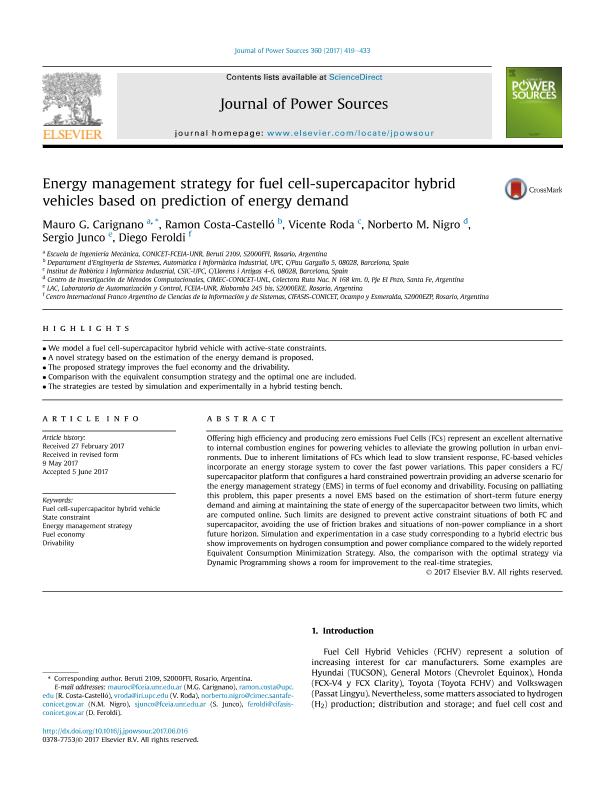Mostrar el registro sencillo del ítem
dc.contributor.author
Carignano, Mauro

dc.contributor.author
Costa-Castelló, Ramon
dc.contributor.author
Roda, Vicente
dc.contributor.author
Nigro, Norberto Marcelo

dc.contributor.author
Junco, Sergio Jose

dc.contributor.author
Feroldi, Diego Hernán

dc.date.available
2018-11-01T17:58:37Z
dc.date.issued
2017-08
dc.identifier.citation
Carignano, Mauro; Costa-Castelló, Ramon; Roda, Vicente; Nigro, Norberto Marcelo; Junco, Sergio Jose; et al.; Energy management strategy for fuel cell-supercapacitor hybrid vehicles based on prediction of energy demand; Elsevier Science; Journal of Power Sources; 360; 8-2017; 419-433
dc.identifier.issn
0378-7753
dc.identifier.uri
http://hdl.handle.net/11336/63459
dc.description.abstract
Offering high efficiency and producing zero emissions Fuel Cells (FCs) represent an excellent alternative to internal combustion engines for powering vehicles to alleviate the growing pollution in urban environments. Due to inherent limitations of FCs which lead to slow transient response, FC-based vehicles incorporate an energy storage system to cover the fast power variations. This paper considers a FC/supercapacitor platform that configures a hard constrained powertrain providing an adverse scenario for the energy management strategy (EMS) in terms of fuel economy and drivability. Focusing on palliating this problem, this paper presents a novel EMS based on the estimation of short-term future energy demand and aiming at maintaining the state of energy of the supercapacitor between two limits, which are computed online. Such limits are designed to prevent active constraint situations of both FC and supercapacitor, avoiding the use of friction brakes and situations of non-power compliance in a short future horizon. Simulation and experimentation in a case study corresponding to a hybrid electric bus show improvements on hydrogen consumption and power compliance compared to the widely reported Equivalent Consumption Minimization Strategy. Also, the comparison with the optimal strategy via Dynamic Programming shows a room for improvement to the real-time strategies.
dc.format
application/pdf
dc.language.iso
eng
dc.publisher
Elsevier Science

dc.rights
info:eu-repo/semantics/openAccess
dc.rights.uri
https://creativecommons.org/licenses/by-nc-sa/2.5/ar/
dc.subject
Fuel Cell-Supercapacitor Hybrid Vehicle
dc.subject
State Constraint
dc.subject
Energy Management Strategy
dc.subject
Fuel Economy
dc.subject
Drivability
dc.subject.classification
Ingeniería de Sistemas y Comunicaciones

dc.subject.classification
Ingeniería Eléctrica, Ingeniería Electrónica e Ingeniería de la Información

dc.subject.classification
INGENIERÍAS Y TECNOLOGÍAS

dc.title
Energy management strategy for fuel cell-supercapacitor hybrid vehicles based on prediction of energy demand
dc.type
info:eu-repo/semantics/article
dc.type
info:ar-repo/semantics/artículo
dc.type
info:eu-repo/semantics/publishedVersion
dc.date.updated
2018-10-23T16:37:17Z
dc.journal.volume
360
dc.journal.pagination
419-433
dc.journal.pais
Países Bajos

dc.journal.ciudad
Amsterdam
dc.description.fil
Fil: Carignano, Mauro. Universidad Nacional de Rosario; Argentina
dc.description.fil
Fil: Costa-Castelló, Ramon. Universidad Politécnica de Catalunya; España
dc.description.fil
Fil: Roda, Vicente. Universidad Politécnica de Catalunya; España
dc.description.fil
Fil: Nigro, Norberto Marcelo. Consejo Nacional de Investigaciones Científicas y Técnicas. Centro Científico Tecnológico Conicet - Santa Fe. Centro de Investigaciones en Métodos Computacionales. Universidad Nacional del Litoral. Centro de Investigaciones en Métodos Computacionales; Argentina
dc.description.fil
Fil: Junco, Sergio Jose. Universidad Nacional de Rosario; Argentina
dc.description.fil
Fil: Feroldi, Diego Hernán. Consejo Nacional de Investigaciones Científicas y Técnicas; Argentina
dc.journal.title
Journal of Power Sources

dc.relation.alternativeid
info:eu-repo/semantics/altIdentifier/url/http://linkinghub.elsevier.com/retrieve/pii/S0378775317307887
dc.relation.alternativeid
info:eu-repo/semantics/altIdentifier/doi/http://dx.doi.org/10.1016/j.jpowsour.2017.06.016
Archivos asociados
